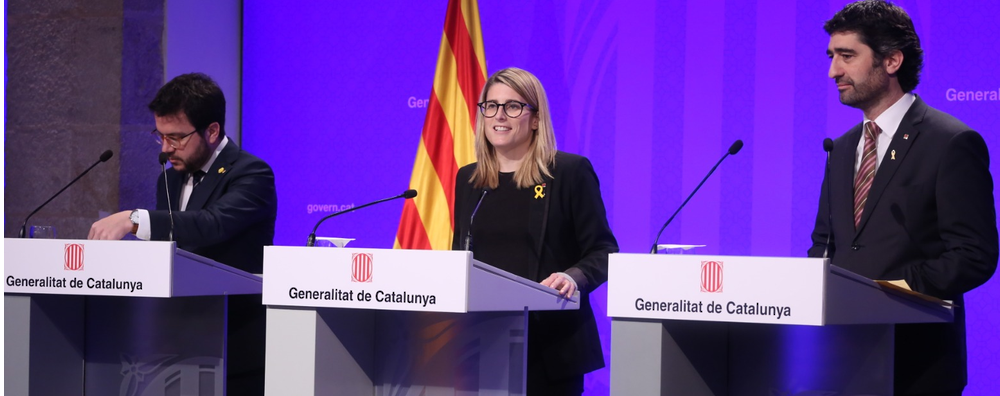- Minister Puigneró: “The approval of the 5G strategy paves the way for Catalonia to become the capital of 5G
- “Catalonia has always been a country of creators, visionaries and innovators. Today, we’re ready to lead the global digital revolution”

The Minister of the Presidency and government spokesperson, Elsa Artadi – together with the Vice President and Minister of Economy and Finance, Pere Aragonès, and the Minister for Digital Policy and Public Administration, Jordi Puigneró – explained the government resolutions approved by the Executive Council. Vice President Aragonès reported on the government’s preliminary draft budget, and Minister Puigneró described the 5G strategy approved by the government to coincide with the start of the Mobile World Congress.
5G strategy
The Executive Council has given the green light to Catalonia’s 5G strategy while the 14th edition of the Mobile World Congress (MWC) is under way in Barcelona this week. The Minister for Digital Policy and Public Administration, Jordi Puigneró, said: “Catalonia has been a country of creators, visionaries and innovators. Today, we’re ready to lead the global digital revolution. The innovators of the 21st century are the digital revolutionaries.”
The minister stressed that “if we want to remain the capital of mobile, we also have to be the capital of 5G. The strategy approved by the government is intended to make Catalonia the 5G capital.” The executive believes Catalonia has the capabilities required to become a pole of attraction for the roll-out of technology, services and a new industry linked to development of the 5G network.
The 5G strategy is built around five lines of action:
- 5G Infrastructure: accelerate the orderly and inclusive deployment of infrastructure
- 5G Ecosystem: foster a new high-added-value 5G industry and ecosystem
- 5G Innovation: boost innovation and research
- 5G Promotion: create an international benchmark
- 5G Talent: attract talent and provide specialised training
Mediterranean 5G corridor
The strategy document envisages the creation of a 5G cross-border corridor to enable the development of medium-scale autonomous and connected vehicle projects.
The European Union is in the process of defining the continent’s 5G corridors. Catalonia and Occitania have worked together to prepare the Mediterranean 5G corridor candidature as one of the priority projects funded by the European Union. This project is very important for the digital industry, and critical for the automotive industry because it will create a test bed for the car of the future.
The corridor will be deployed along the AP-7 motorway in Catalonia, extending beyond the border, so that the motorway is connected to 5G infrastructures and driverless vehicles can circulate on it. The corridor will make it possible to define 5G deployment standards, increase road safety, and design new digital services to offer users.
Deploying the infrastructure of the future
The strategy envisages the efficient and orderly deployment of a new 5G network throughout Catalonia. The good condition of the current 4G network and the possibility of upgrading existing infrastructure will facilitate a more efficient and orderly roll-out of 5G.
The deployment of a public fibre-optic network owned by the Catalan government will ensure the connectivity of 5G antennas throughout the territory. It is anticipated that all county capitals will be connected to the Catalan government’s fibre-optic network by 2020, and that all municipalities will be guaranteed an access point by 2023.
The government will also create a governance model to ensure that 5G is implemented in a way that respects people and the environment, and a board for the roll-out of 5G throughout the territory, which will serve as a forum where representatives of various administrations and other actors can come together to agree a joint strategy.
In addition, a programme will be carried out throughout Catalonia to raise awareness of the opportunities that 5G will present and new business models linked to the technology. The programme will include the creation of a 5G Observatory to identify, catalogue and analyse good practices, trends, and progress on the deployment of 5G technology.
A new 5G industry based on digital innovation
Through its Advanced Digital Technologies programme, the government will promote 5G in research and innovation, creating testing environments to spread the technology throughout Catalonia.
Catalonia currently has internationally renowned research and innovation centres in the field of 5G. These centres are participating in 22 of the 37 research projects on 5G funded by the European Commission. The new strategy will bolster alliances between these research and innovation centres and the promotion of laboratories where researchers can do creative work in real environments, pursuing key projects such as connected vehicles, application of drone technology, and smart urban solutions (smart cities).
The Catalan public administration also wants to introduce 5G technology and will explore innovative uses in health, emergency response services, mobility, logistics, the media and many other areas.
Through the Telecommunications and Information Technologies Centre (CTTI), the Catalan government has also fostered 5G research and implementation in competitive bidding for public communications contracts.
The government worked to achieve an agreement with other administrations, research centres and technology actors to launch the “5G Barcelona” initiative, a public-private project that will progressively bring in more companies and entities to create 5G access test areas.
